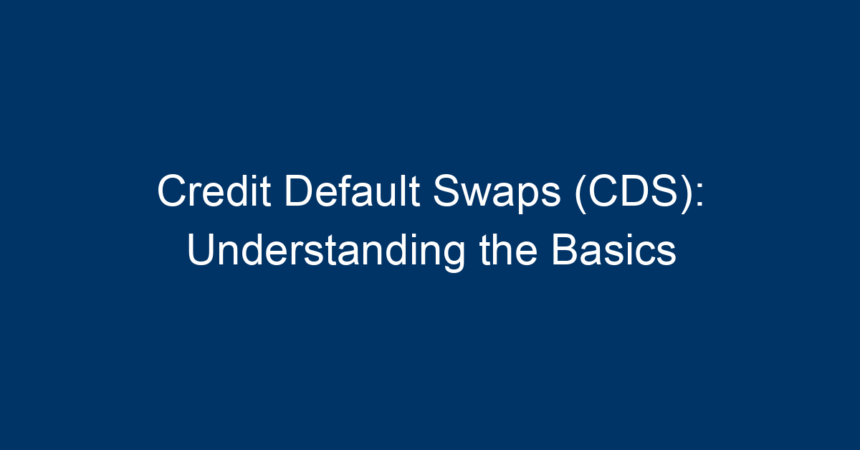In the complex world of finance, few instruments are as misunderstood yet as crucial as credit default swaps (CDS). As financial markets continue to evolve, the demand for risk management tools has skyrocketed. This article delves into the essentials of credit default swaps, offering clarity on what they are, how they function, and their implications in the broader financial landscape.
What Are Credit Default Swaps (CDS)?
At its core, a credit default swap (CDS) is a financial derivative that allows an investor to "swap" or transfer the credit risk of a borrower, typically a corporation or a sovereign entity, to another party. Think of it as an insurance policy against default. When one party pays a premium (the CDS fee) to another, the seller of the swap agrees to compensate the buyer if a specified credit event occurs, such as a default on debt obligations.
Key Components of CDS
- Reference Entity: The borrower whose credit risk is being insured.
- Notional Amount: The agreed-upon amount that a CDS contract covers, usually tied to the value of the underlying debt instruments.
- Premium: The regular payments made by the buyer to the seller of the CDS, akin to an insurance premium.
- Credit Event: Specific predefined occurrences, like bankruptcy or restructuring, that trigger the swap’s payout.
The Functioning of Credit Default Swaps
To understand credit default swaps better, let’s break down how they operate step by step.
1. Contract Initiation
When an investor believes a reference entity is at risk of default, they may purchase a CDS for that entity. This transaction usually involves private agreements between two parties—an investor and a dealer or another investor.
2. Premium Payments
The buyer of the CDS pays a periodic premium to the seller. This fee varies based on the perceived risk associated with the reference entity. Riskier entities command higher premiums.
3. Triggering a Credit Event
If a credit event occurs (e.g., the reference entity defaults), the seller of the CDS must compensate the buyer. This compensation can take the form of a cash payment, often reflecting the difference between the notional amount and the recovery value of the debt after the event.
4. Settlement
The CDS can be settled in two ways: physical settlement, where the buyer delivers the underlying bonds to the seller in exchange for the notional amount, or cash settlement, where the seller pays the buyer a cash equivalent.
Benefits of Using Credit Default Swaps
Credit default swaps (CDS) offer a variety of benefits that make them attractive to investors, including:
1. Risk Management
Investors can hedge against potential losses caused by credit events. This aspect is especially valuable for portfolio managers holding bonds or stocks of risky companies.
2. Speculation
Traders can also use CDS for speculative purposes, betting on the likelihood of a credit event. If they believe a company’s financial health will deteriorate, they may purchase a CDS to profit from the anticipated decline.
3. Enhanced Liquidity
CDS contribute to the liquidity of the credit market. By allowing investors to trade credit risk, these instruments enhance market efficiency.
4. Price Discovery
CDS markets provide critical data about the perceived credit risk of corporations and countries. The premiums paid offer insights into market sentiment and risk appetite.
Risks Associated with Credit Default Swaps
While credit default swaps have their advantages, they are not without risks:
1. Counterparty Risk
This is the risk that the seller of the CDS will not fulfill their payment obligations if a credit event occurs. The 2008 financial crisis emphasized the dangers associated with counterparty risk.
2. Market Risk
The value of CDS can fluctuate based on broader market conditions, potentially leading to significant losses even in the absence of a credit event.
3. Complexity
The intricate structure of CDS contracts can make them difficult to understand, leading to potential misuse or mispricing.
4. Regulatory Scrutiny
In recent years, increased regulatory oversight has affected the trading of CDS, impacting market dynamics and participant behaviors.
Historical Context of Credit Default Swaps
Credit default swaps entered the financial scene in the late 1990s and gained widespread attention during the financial crisis of 2007-2008. They were both criticized and scrutinized for their role in the collapse of major financial institutions. Many believe that the misuse and lack of regulation concerning CDS contributed significantly to the crisis.
The Role of CDS in the 2008 Financial Crisis
The 2008 crisis highlighted systemic risks associated with credit default swaps. Major institutions like AIG faced immense losses due to their exposure to CDS, leading to unprecedented government bailouts. This situation sparked a global conversation about the need for stricter oversight and transparency in derivative markets.
The Regulatory Landscape
In the aftermath of the 2008 crisis, regulators worldwide took significant measures to improve the transparency and stability of the derivatives market, including CDS. Key reforms included:
1. Dodd-Frank Act
In the U.S., the Dodd-Frank Wall Street Reform and Consumer Protection Act mandated greater transparency in the trading and reporting of derivatives, including requiring standardized CDS to be cleared through central counterparties.
2. European Market Infrastructure Regulation (EMIR)
In Europe, EMIR was implemented to reduce risks associated with over-the-counter (OTC) derivatives, including mandatory clearing and reporting requirements for CDS.
Conclusion: Navigating the World of Credit Default Swaps
Understanding credit default swaps (CDS) is essential for investors looking to navigate today’s complex financial landscape. These instruments can serve as valuable tools for risk management and speculation. However, it’s crucial to remain aware of the associated risks and the ongoing regulatory environment.
Actionable Insights
- Educate Yourself: Taking courses or reading further about derivatives and risk management can provide a solid foundation for understanding CDS.
- Stay Informed: Keep abreast of market trends and regulatory changes that may impact the CDS market.
- Consult Professionals: If considering entering the CDS market, consult financial advisors or professionals to assess risks and develop a sound strategy.
In short, while credit default swaps may appear daunting at first, a thorough understanding can empower investors to make informed decisions in a dynamic financial environment. By weighing the benefits against the risks and staying aware of the broader implications, you can effectively leverage CDS as part of your investment strategy.




